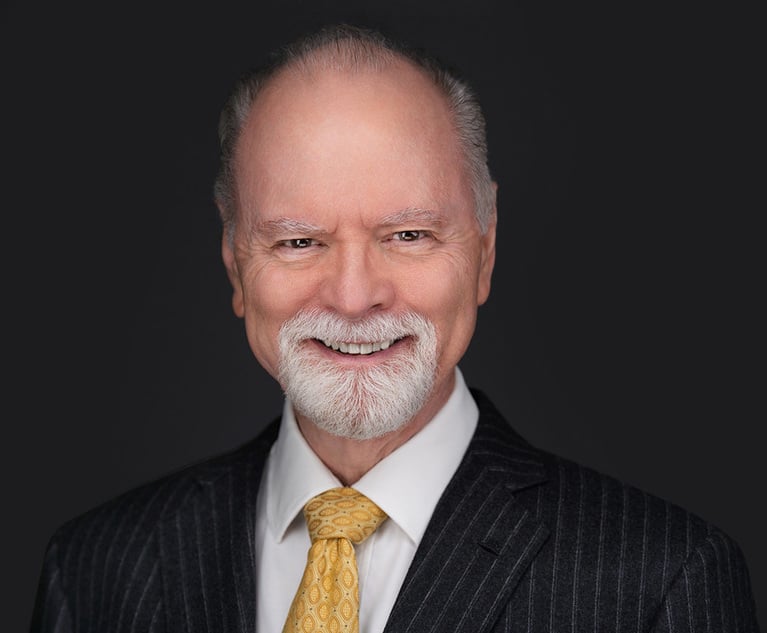Fired GC Tries to Laugh Off Bio-Rad's Appeal of His Winning Verdict
Sanford Wadler, former Bio-Rad GC and whistleblower, won a retaliation case earlier this year against his former employer.
December 18, 2017 at 05:33 PM
3 minute read
 Sanford Wadler. Photo: Jason Doiy/ALM.
Sanford Wadler. Photo: Jason Doiy/ALM.
Arguments by Bio-Rad Laboratories Inc. that the $11 million verdict in favor of its fired whistleblowing general counsel, Sanford Wadler, should be reversed or vacated on appeal were called laughable in Wadler's latest brief.
Wadler's attorneys, from San Francisco's Kerr & Wagstaffe, filed the reply brief late Friday in the U.S. Court of Appeals for the Ninth Circuit. Firm co-founder James Wagstaffe leads Wadler's legal team and partner Michael von Loewenfeldt authored the brief. Wadler's lawyers did not immediately return calls seeking comment on the case that just won't seem to end.
Wadler sued Bio-Rad in 2015 following his firing. He claimed the dismissal was in retaliation for going over his boss' head and telling Bio-Rad's audit committee that the company may have engaged in bribery in China. A costly internal investigation that followed found no bribery violations.
A federal judge and jury in U.S. District Court for the Northern District of California shut Bio-Rad down at trial. But rather than seek to settle the case, the company filed its appeal brief seeking to overturn the verdict in mid-October.
The filing by Quinn Emanuel Urquhart & Sullivan cited four alleged trial errors. They included an improper jury instruction on applying the Sarbanes-Oxley Act; failure to prove that Wadler had an “objectively reasonable belief” of violations of the Foreign Corrupt Practices Act; a ruling that barred Bio-Rad from presenting other evidence about Wadler and his motives; and another ruling that allowed the jury to apply the Dodd-Frank Act's whistleblowing provision to the case.
Quinn Emanuel partner William Adams told Corporate Counsel today, “Bio-Rad agrees that the standards for protecting whistleblowers are important. But Congress has prescribed clear standards for such protection that Mr. Wadler did not satisfy in this case. We look forward to the opportunity to reply to Mr. Wadler's argument in our further briefing and at oral argument.”
But Wadler's lawyers used their 74-page reply not only to dispute the four alleged errors, but also to remind Bio-Rad and the appeals court why the company lost a unanimous verdict in the first place. In elaborate detail, the brief dredged up past Bio-Rad FCPA violations in other countries, and it compared those violations to the China situation.
And it hammered on instances where Bio-Rad execs were found to misrepresent facts at trial, including the post-dating of a termination letter to Wadler.
It argued that SOX and Dodd-Frank were applied correctly, and even if they weren't, there was no prejudicial error in jury instructions. It said the evidence clearly supported the jury's finding that Wadler held an “objectively reasonable belief” that Bio-Rad had violated the FCPA. And it said the two evidentiary rulings were immaterial.
“As a full view of the evidence shows, there was substantial evidence on each element of Wadler's claim, the jury clearly rejected each of Bio-Rad's numerous defense theories, and Bio-Rad's main witnesses had no credibility after being repeatedly impeached and having been caught manufacturing evidence,” the brief said.
The filing concluded, “The assertion that different rulings on these two small evidentiary disputes would have made any difference is risible.”
This content has been archived. It is available through our partners, LexisNexis® and Bloomberg Law.
To view this content, please continue to their sites.
Not a Lexis Subscriber?
Subscribe Now
Not a Bloomberg Law Subscriber?
Subscribe Now
NOT FOR REPRINT
© 2025 ALM Global, LLC, All Rights Reserved. Request academic re-use from www.copyright.com. All other uses, submit a request to [email protected]. For more information visit Asset & Logo Licensing.
You Might Like
View All
The Time Is Now for Employers to Assess Risk of Employees’ Use of DeepSeek
4 minute read

California Court Denies Apple's Motion to Strike Allegations in Gender Bias Class Action
Trending Stories
- 1States Accuse Trump of Thwarting Court's Funding Restoration Order
- 2Microsoft Becomes Latest Tech Company to Face Claims of Stealing Marketing Commissions From Influencers
- 3Coral Gables Attorney Busted for Stalking Lawyer
- 4Trump's DOJ Delays Releasing Jan. 6 FBI Agents List Under Consent Order
- 5Securities Report Says That 2024 Settlements Passed a Total of $5.2B
Who Got The Work
J. Brugh Lower of Gibbons has entered an appearance for industrial equipment supplier Devco Corporation in a pending trademark infringement lawsuit. The suit, accusing the defendant of selling knock-off Graco products, was filed Dec. 18 in New Jersey District Court by Rivkin Radler on behalf of Graco Inc. and Graco Minnesota. The case, assigned to U.S. District Judge Zahid N. Quraishi, is 3:24-cv-11294, Graco Inc. et al v. Devco Corporation.
Who Got The Work
Rebecca Maller-Stein and Kent A. Yalowitz of Arnold & Porter Kaye Scholer have entered their appearances for Hanaco Venture Capital and its executives, Lior Prosor and David Frankel, in a pending securities lawsuit. The action, filed on Dec. 24 in New York Southern District Court by Zell, Aron & Co. on behalf of Goldeneye Advisors, accuses the defendants of negligently and fraudulently managing the plaintiff's $1 million investment. The case, assigned to U.S. District Judge Vernon S. Broderick, is 1:24-cv-09918, Goldeneye Advisors, LLC v. Hanaco Venture Capital, Ltd. et al.
Who Got The Work
Attorneys from A&O Shearman has stepped in as defense counsel for Toronto-Dominion Bank and other defendants in a pending securities class action. The suit, filed Dec. 11 in New York Southern District Court by Bleichmar Fonti & Auld, accuses the defendants of concealing the bank's 'pervasive' deficiencies in regards to its compliance with the Bank Secrecy Act and the quality of its anti-money laundering controls. The case, assigned to U.S. District Judge Arun Subramanian, is 1:24-cv-09445, Gonzalez v. The Toronto-Dominion Bank et al.
Who Got The Work
Crown Castle International, a Pennsylvania company providing shared communications infrastructure, has turned to Luke D. Wolf of Gordon Rees Scully Mansukhani to fend off a pending breach-of-contract lawsuit. The court action, filed Nov. 25 in Michigan Eastern District Court by Hooper Hathaway PC on behalf of The Town Residences LLC, accuses Crown Castle of failing to transfer approximately $30,000 in utility payments from T-Mobile in breach of a roof-top lease and assignment agreement. The case, assigned to U.S. District Judge Susan K. Declercq, is 2:24-cv-13131, The Town Residences LLC v. T-Mobile US, Inc. et al.
Who Got The Work
Wilfred P. Coronato and Daniel M. Schwartz of McCarter & English have stepped in as defense counsel to Electrolux Home Products Inc. in a pending product liability lawsuit. The court action, filed Nov. 26 in New York Eastern District Court by Poulos Lopiccolo PC and Nagel Rice LLP on behalf of David Stern, alleges that the defendant's refrigerators’ drawers and shelving repeatedly break and fall apart within months after purchase. The case, assigned to U.S. District Judge Joan M. Azrack, is 2:24-cv-08204, Stern v. Electrolux Home Products, Inc.
Featured Firms
Law Offices of Gary Martin Hays & Associates, P.C.
(470) 294-1674
Law Offices of Mark E. Salomone
(857) 444-6468
Smith & Hassler
(713) 739-1250







